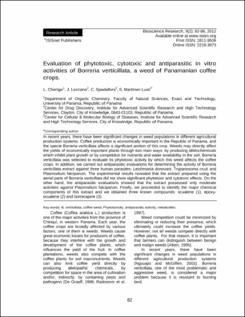Mostrar el registro sencillo del ítem
Evaluation of phytotoxic, cytotoxic and antiparasitic in vitro activities of Borreria verticillata, a weed of Panamanian coffee crops.
| dc.contributor.author | Cherigo, L. | |
| dc.contributor.author | Lezcano, J. | |
| dc.contributor.author | Spadafora, Carmenza | |
| dc.contributor.author | Martínez-Luis, Sergio | |
| dc.date.accessioned | 2020-07-21T20:30:24Z | |
| dc.date.available | 2020-07-21T20:30:24Z | |
| dc.date.issued | 2012-01-01 | |
| dc.identifier.issn | ISSN: 2218-3973 | |
| dc.identifier.uri | http://repositorio-indicasat.org.pa/handle/123456789/211 | |
| dc.description | In recent years, there have been significant changes in weed populations in different agricultural production systems. Coffee production is economically important in the Republic of Panama, and the specie Borreria verticillata affects a significant portion of this crop. Weeds may directly affect the yields of economically important plants through two main ways: by producing allelochemicals which inhibit plant growth or by competition for nutrients and water availability in the soil. Borreria verticillata was selected to evaluate its phytotoxic activity by which this weed affects the coffee crops. In addition, we carried out antiparasitic evaluations for determining the activity of Borreria verticillata extract against three human parasites: Leishmania donovani, Trypanosoma cruzi and Plasmodium falciparum. The experimental results revealed that the extract prepared using the aerial parts of Borreria verticillata did not show significant phytotoxic and cytotoxic effects. On the other hand, the antiparasitic evaluations showed that the extract possessed only moderate activities against Plasmodium falciparum. Finally, we proceeded to identify the major chemical components of this extract and we obtained three known compounds: scualene (1), epoxyscualene (2) and borrecapine (3). | en_US |
| dc.description.abstract | In recent years, there have been significant changes in weed populations in different agricultural production systems. Coffee production is economically important in the Republic of Panama, and the specie Borreria verticillata affects a significant portion of this crop. Weeds may directly affect the yields of economically important plants through two main ways: by producing allelochemicals which inhibit plant growth or by competition for nutrients and water availability in the soil. Borreria verticillata was selected to evaluate its phytotoxic activity by which this weed affects the coffee crops. In addition, we carried out antiparasitic evaluations for determining the activity of Borreria verticillata extract against three human parasites: Leishmania donovani, Trypanosoma cruzi and Plasmodium falciparum. The experimental results revealed that the extract prepared using the aerial parts of Borreria verticillata did not show significant phytotoxic and cytotoxic effects. On the other hand, the antiparasitic evaluations showed that the extract possessed only moderate activities against Plasmodium falciparum. Finally, we proceeded to identify the major chemical components of this extract and we obtained three known compounds: scualene (1), epoxyscualene (2) and borrecapine (3). | en_US |
| dc.format | application/pdf | |
| dc.language.iso | eng | en_US |
| dc.rights | Info:eu-repo/semantics/openAccess | |
| dc.rights | https://creativecommons.org/licenses/by/4.0/deed.es | |
| dc.subject | B. verticillata | en_US |
| dc.subject | coffee weed | en_US |
| dc.subject | Phytotoxicity | en_US |
| dc.subject | antiparasitic activity | en_US |
| dc.subject | metabolites | en_US |
| dc.title | Evaluation of phytotoxic, cytotoxic and antiparasitic in vitro activities of Borreria verticillata, a weed of Panamanian coffee crops. | en_US |
| dc.type | info:eu-repo/semantics/article | en_US |
| dc.type | Info:eu-repo/semantics/publishedversion |

